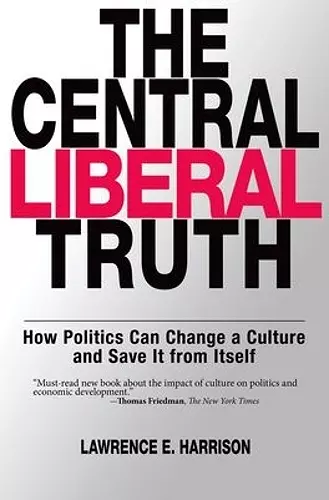The Central Liberal Truth
How Politics Can Change a Culture and Save It from Itself
Format:Paperback
Publisher:Oxford University Press Inc
Published:10th Jul '08
Currently unavailable, and unfortunately no date known when it will be back

Which cultural values, beliefs, and attitudes best promote democracy, social justice, and prosperity? How can we use the forces that shape cultural change, such as religion, child-rearing practices, education, and political leadership, to promote these values in the Third World--and for underachieving minorities in the First World? In this book, Lawrence E. Harrison offers intriguing answers to these questions, in a valuable follow-up to his acclaimed Culture Matters. Drawing on a three-year research project that explored the cultural values of dozens of nations--from Botswana, Sweden, and India to China, Egypt, and Chile--Harrison offers a provocative look at values around the globe, revealing how each nation's culture has propelled or retarded their political and economic progress. The book presents 25 factors that operate very differently in cultures prone to progress and those that resist it, including one's influence over destiny, the importance attached to education, the extent to which people identify with and trust others, and the role of women in society. Harrison pulls no punches, and many of his findings will be controversial. He argues, for example, that Protestantism, Confucianism, and Judaism have been more successful in promoting progress than Catholicism, Orthodox Christianity, and Islam. Harrison rejects the Bush administration's doctrine that "the values of freedom are right and true for every person, in every society." Thus nations like Iraq and Afghanistan--where illiteracy, particularly among women, and mistrust are high and traditions of cooperation and compromise are scant--are likely to resist democracy. Most important, the book outlines a series of practical guidelines that developing nations and lagging minority groups can use to enhance their political, social, and economic well-being. Contradicting the arguments of multiculturalists, this book contends that when it comes to promoting human progress, some cultures are clearly more effective than others. It convincingly shows which values, beliefs, and attitudes work and how we can foster them.
"Must-read new book about the impact of culture on politics and economic development."--Thomas Friedman, The New York Times
"It is not often that a book appears of such intellectual force and power that it can completely change the debate on an issue. Larry Harrison's book The Central Liberal Truth has done that for development theory. He has made an argument so compelling that it can not be ignored by even those who disagree with his research. This book is a must read."--Andrew Natsios, former Administrator, U.S. Agency for International Development
"Nothing is so important and tenacious as culture (values and institutions) in shaping economic performance, and nothing so decisive as economic performance in determining political and social possibilities and structure. This book is a global, historical, empirical approach to these connections, as exemplified by the major stories of success, failure, and cases in between. I can think of no better entrance to the topic, both for what it teaches and the way it invites and prepares the reader to continue. A gateway study."--David S. Landes, author of The Wealth and Poverty of Nations: Why Some Are So Rich and Some So Poor
"Harrison takes up the question that is at the center of politics today: Can we self-consciously change cultures so they encourage development and modernization...? Harrison observes that gigantic investments in education, and especially in improving female literacy, usually precede transformations. Chile was highly literate in the 19th century, and in 1905, 90 percent of Japanese children were in school. These investments laid the groundwork for takeoffs that were decades away. Harrison points to many other factors--leaders who encourage economic liberalization, movements that restrict the power of the clerics--but the main impressions he leaves are that cultural change is measured in centuries, not decades, and that cultures are separated from one another by veils of complexity and difference."--David Brooks, The New York Times
"Lawrence Harrison's previous writings have made him a leading, perhaps the leading, scholar exploring, analyzing, and documenting the central impact of culture on how society develops, or fails to develop, economically and politically. In The Central Liberal Truth, he draws on his immense knowledge and long experience to spell out the ways societies suffering from cultural attributes unfavorable to development can overcome these obstacles. The Central Liberal Truth is an impressive, persuasive, and indispensable book for anyone interested in improving the conditions of human life in poor countries."--Samuel Huntington, author of Who Are We: The Challenges to American National Identity and The Clash of Civilizations and the Remaking of World Order
"Authors who emphasize the role of culture in development are often accused of consigning whole peoples to backwardness because they are locked into the wrong values. Larry Harrison takes culture seriously, but shows that culture evolves, and offers a practical agenda for cultural change."--Francis Fukuyama, author of Nation-Building: Beyond Afghanistan and Iraq and The End of History and the Last Man
"This important book represents the culmination of a decades-long process of professional experience, research and writing, the achievement of which is a major enrichment of the study of both the nature of societies and of their strengths and weaknesses."--Vineyard Gazette
"A book of enormous importance and startling originality. Harrison has pulled off an amazing intellectual feat. He has drawn our attention both to the centrality of culture in historical outcomes and to the ability of good public policy to reshape economic and political history."--Fouad Ajami, Majid Khadduri Professor and Director of Middle East Studies at Johns Hopkins University, School of Advanced International Studies
ISBN: 9780195331806
Dimensions: 235mm x 155mm x 21mm
Weight: 449g
288 pages